Collection of materials relating to neuro-ophthalmology as part of the Neuro-Ophthalmology Virtual Education Library.
NOVEL: https://novel.utah.edu/
TO
- NOVEL980
Filters: Collection: "ehsl_novel_novel"
| Title | Creator | Description | Subject | ||
|---|---|---|---|---|---|
| 276 |
 |
Eyelid Myokymia | NANOS | Eyelid myokymia is a very common condition that many people have experienced at least briefly at one time or another, though the exact prevalence is not known. Myokymia is characterized by involuntary fine contractions or "twitching" of the eyelids. | Eyelid Myokymia; Patient Brochure |
| 277 |
 |
Progressive Supranuclear Palsy | NANOS | Progressive Supranuclear Palsy (PSP) is a rare progressive neurodegenerative disorder that affects certain parts of the brain, resulting in difficulty with balance, walking, swallowing, and vision. | Progressive Supranuclear Palsy; Patient Brochure |
| 278 |
 |
The Mental Status Examination (MSE): The Basics | Victoria S. Pelak, MD | An overview of the Mental Status Examination. | Mental Status Examination; Examinations |
| 279 |
 |
Management of Non-Organic Vision Loss | Aumer Shughoury, BA; Devin D. Mackay, MD | A description of the management of non-organic visual loss. | Non-Organic Vision Loss; NOVL |
| 280 |
 |
Confrontation Visual Fields - A Concise Guide for Ophthalmology and Neurology Trainees | Stephen C. Pollock, MD | The guide describes the techniques required to competently perform confrontation visual fields. It outlines a basic screening protocol and discusses methods for further defining defects identified during the screening process. A mini-atlas of visual field defects is included as an appendix. | Confrontation Visual Fields; Visual Field Testing; Perimetry; Visual Field Loss; Visual Field Defect; Ocular Examination; Visual Sensory Evaluation; Neurologic Examination |
| 281 |
 |
Right Lateral Medulla and Cerebellar Stroke | Jorge C Kattah, MD | This patient presented with an acute vestibular syndrome, he has a h-left beat nystagmus and a normal head impulse test . He had grade 3 truncal ataxia and severe ocular lateropulsion to the right (type 1 overt OL). Hypometric leftward, centripetal, slow saccades were video-recorded even six weeks... | Right Lateral Medulla; Cerebellar Stroke |
| 282 |
 |
Ocular Lateropulsion Left AICA Stroke | Jorge C Kattah, MD | 82 year-old patient with basilar artery stenosis, she developed an acute left AICA stroke. On examination within 24 hours from symptom onset, she had primary gaze, unidirectional, right beat nystagmus and a positive left head impulse test. Brief periods of eyelid closure were associated with a h-... | Ocular Lateropulsion; AICA Stroke |
| 283 |
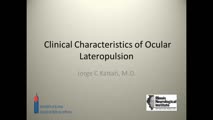 |
Clinical Characteristics of Ocular Lateropulsion | Jorge C Kattah, MD | A discussion of the normal mechanism that maintain the eyes in normal horizontal position. | Ocular Lateropulsion; Unilateral Gaze Palsy; Radiographic h-CGD |
| 284 |
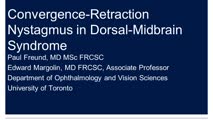 |
Convergence-Retraction Nystagmus in Dorsal-Midbrain Syndrome | Paul Freund, MD, FRCSC; Edward Margolin, MD, FRCSC | A man in his early twenties was referred by optometrist for abnormal eye motility findings. He had a remote history of an excised pinealoma. On exam he had almost complete upgaze palsy, convergence-retraction nystagmus on attempted upgaze, and light-near dissociation of pupillary reaction, the class... | Dorsal Midbrain Syndrome; Parinaud Syndrome; Convergence-Retraction Nystagmus; Light-Near Dissociation |
| 285 |
 |
Dual Visual Field Defect (Quadrantanopia and Central Scotoma) Unmasks the Hidden Brain Lesion in a Patient with Non-arteritic Ischemic Optic Neuropathy | A. Mohan Kannam; B. Rajat Kapoor; C. Ramesh Kekunnaya, FRCS; Virender Sachdeva, MS, DNB | This submission is an interesting case that highlights the co-existence of two different visual field defects in the same patient presenting to us with clinical picture of non arteritic ischemic optic neuropathy. The correct interpretation of the visual field defects led to the appropriate localizat... | Hemianopia; Central Field Defect; Non-Arteritic Ischemic Optic Neuropathy; Ischemic Infarct |
| 286 |
 |
Introduction to Diagnostic Testing: Audio-Vestibular | Daniel R. Gold, DO | Introduction to the audio-vestibular diagnostic testing section of the NExT curriculum. | Diagnostic Testing; Exams; Audio-Vestibular |
| 287 |
 |
Introduction to Examination of the Vestibular System | Daniel R. Gold, DO | Introduction to the Vestibular System Examination section of the NExT curriculum. | Exams; Vestibular System |
| 288 |
 |
Clinical Visual Electrophysiology | Gregory P. Van Stavern, MD; Byron Lam, MD | A description of the use of electrophysiology to examine the visual system. | Electrophysiology; Visual Exam |
| 289 |
 |
Fundus Fluorescein Angiography: What Is It and When Is It Useful for Neuro-Ophthalmology? | Clare L. Fraser, MBBS; Elisa E. Cornish, PhD | An introduction to the use of fluorescein angiography. | Fluorescein Angiography; Visual Exam |
| 290 |
 |
Hirschberg Test Corneal Reflex Test | Nagham Al-Zubidi, MD | Description of the Hirschberg test a the corneal reflex test. | Hirschberg Test; Corneal Reflex |
| 291 |
 |
Introduction to Ocular Examination | Ore-ofe Adesina, MD | Introduction to the Ocular Examination section of the NExT curriculum. | Exams; Ocular Examination |
| 292 |
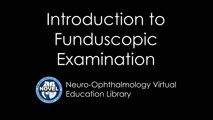 |
Introduction to Funduscopic Examination | Valérie Biousse, MD | Introduction to the funduscopic examination section of the NExT curriculum. | Exams; Funduscopy |
| 293 |
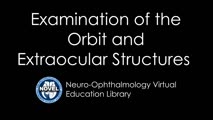 |
Examination of the Orbit and Extraocular Structures | Julie Falardeau, MD | Introduction to the Examination of Orbit and Extraocular Structures in the NExT curriculum. | Exams; Orbit; Extraocular |
| 294 |
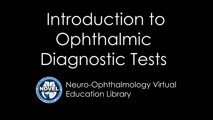 |
Introduction to Ophthalmic Diagnostic Tests | Valérie Biousse, MD | Introduction to the ophthalmic diagnostic testing section of the NExT curriculum. | Exams; Diagnostics |
| 295 |
 |
Other Special Situations | John Pula, MD | Introduction to examinations in special situations. | Exams |
| 296 |
 |
Testing Eye Movements | Marc Dinkin, MD | Description of eye movement testing. | Eye Movements; Exams |
| 297 |
 |
The Mental Status Examination - Non-Cognitive | James R. Bateman, MD, MPH; Victoria S. Pelak, MD | Introduction to the mental status examination. | Mental Status; Non-Cognitive Function |
| 298 |
 |
The Mental Status Examination - Cognitive | James R. Bateman, MD, MPH; Victoria S. Pelak, MD | Introduction to the cognitive mental status examination. See accompanying videos: Executive function: https://collections.lib.utah.edu/ark:/87278/s6bw1rp1, Limb-Kinetic apraxia: https://collections.lib.utah.edu/ark:/87278/s63c084b, Ideomotor apraxia: https://collections.lib.utah.edu/ark:/87278/s674... | Mental Status; Cognitive Function |
| 299 |
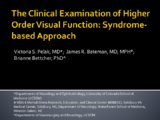 |
The Clinical Examination of Higher Order Visual Function: Syndrome-based Approach - Visual Neglect | Victoria S. Pelak, MD; James R. Bateman, MD, MPH; Brianne Bettcher, PhD | Explanation of higher order visual function examination. See accompanying video, Double simultaneous visual field stimulation: https://collections.lib.utah.edu/ark:/87278/s6gn2h9d | Visual Function; Visual Neglect |
| 300 |
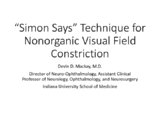 |
"Simon Says" Technique for Nonorganic Visual Field Constriction | Devin D. Mackay, MD | Explanation of the "Simon says" technique. | Simon Says, Visual Field Constriction |
